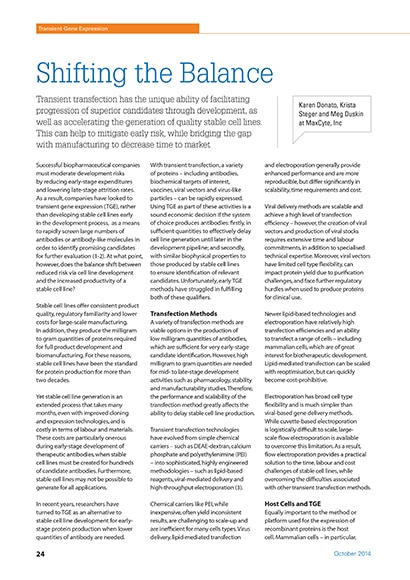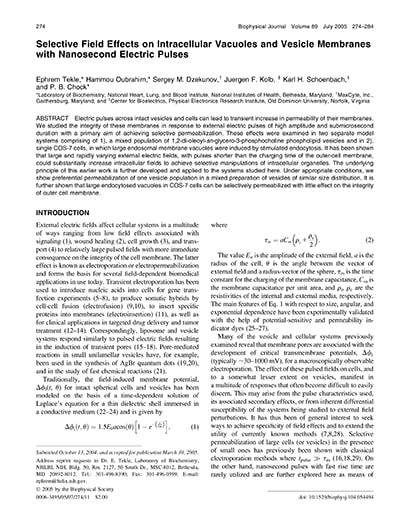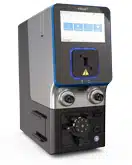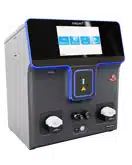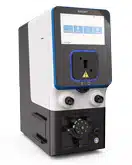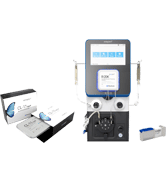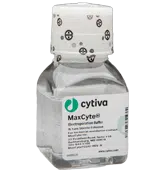Yellow Fluorescent Protein-Based Assay to Measure GABAA Channel Activation and Allosteric Modulation in CHO-K1 Cells
The γ-aminobutyric acid A (GABAA) ion channels are important drug targets for treatment of neurological and psychiatric disorders. Finding GABAA channel subtype selective allosteric modulators could lead to new improved treatments.
Read MoreTreatment of Advanced Leukemia in Mice with mRNA Engineered T Cells
Cytotoxic T lymphocytes (CTLs) modified with chimeric antigen receptors (CARs) for adoptive immunotherapy of hematologic malignancies are effective in preclinical models and are being tested in several clinical trials. Although CTLs bearing stably expressed CARs generated by integrating viral vectors are efficacious and have potential long-term persistence, this mechanism of CAR expression can potentially result in significant toxicity.
Read MoreTargeted gene addition in human CD34+ hematopoietic cells for correction of X-linked chronic granulomatous disease
Gene therapy with genetically modified human CD34+ hematopoietic stem and progenitor cells (HSPCs) may be safer using targeted integration (TI) of transgenes into a genomic ‘safe harbor’ site rather than random viral integration.
Read MoreStructure of human DPEP3 in complex with the SC-003 antibody Fab fragment reveals basis for lack of dipeptidase activity
Journal of Structural Biology – Dipeptidase 3 (DPEP3) is one of three glycosylphosphatidylinositol-anchored metallopeptidases potentially involved in the hydrolytic metabolism of dipeptides. While its exact biological function is not clear, DPEP3 expression is normally limited to testis, but can be elevated in ovarian cancer.
Read MoreSingle-Dose Intranasal Administration of AdCOVID Elicits Systemic and Mucosal Immunity against SARS-CoV-2 and Fully Protects Mice from Lethal Challenge
Intranasal vaccination is an attractive strategy to prevent COVID-19 as the nasal mucosa represents the first-line barrier to SARS-CoV-2 entry.
Read MoreShifting the Balance
Transient transfection has the unique ability of facilitating progression of superior candidates through development, as well as accelerating the generation of quality stable cell lines. This can help to mitigate early risk, while bridging the gap with manufacturing to decrease time to market.
Read MoreSelective Field Effects on Intracellular Vacuoles and Vesicle Membranes with Nanosecond Electric Pulses
Electric pulses across intact vesicles and cells can lead to transient increase in permeability of their membranes. We studied the integrity of these membranes in response to external electric pulses of high amplitude and submicrosecond duration with a primary aim of achieving selective permeabilization.
Read MoreSecond-Generation Antibodies Neutralize Emerging SARS-CoV-2 Variants of Concern
Recently emerged SARS-CoV-2 variants show resistance to some antibodies that were authorized for emergency use. We employed hybridoma technology combined with authentic virus assays to develop second-generation antibodies.
Read MoreRegimen-Specific Effects of RNA-Modified Chimeric Antigen Receptor T Cells in Mice with Advanced Leukemia
Cytotoxic T lymphocytes modified with chimeric antigen receptors (CARs) for adoptive immunotherapy of hematologic malignancies have demonstrated activity in early phase clinical trials. While T cells bearing stably expressed CARs are efficacious and have potential long-term persistence, temporary expression of a CAR via RNA electroporation is also potentially efficacious in preclinical models.
Read MoreRapid, in vivo, evaluation of antiangiogenic and antineoplastic gene products by nonviral transfection of tumor cells
Using a nonviral, electroporation-based gene transfection approach, we demonstrate the efficient and consistent transfection of two poorly immunogenic tumor cell lines: B16F10 melanoma and renal carcinoma (RENCA). Three genes, IL-12, angiostatin (AS), and an endostatin:angiostatin fusion protein (ES:AS) were subcloned into a DNA plasmid containing EBNA1-OriP, which was then transfected into B16F10 and RENCA cells.
Read More